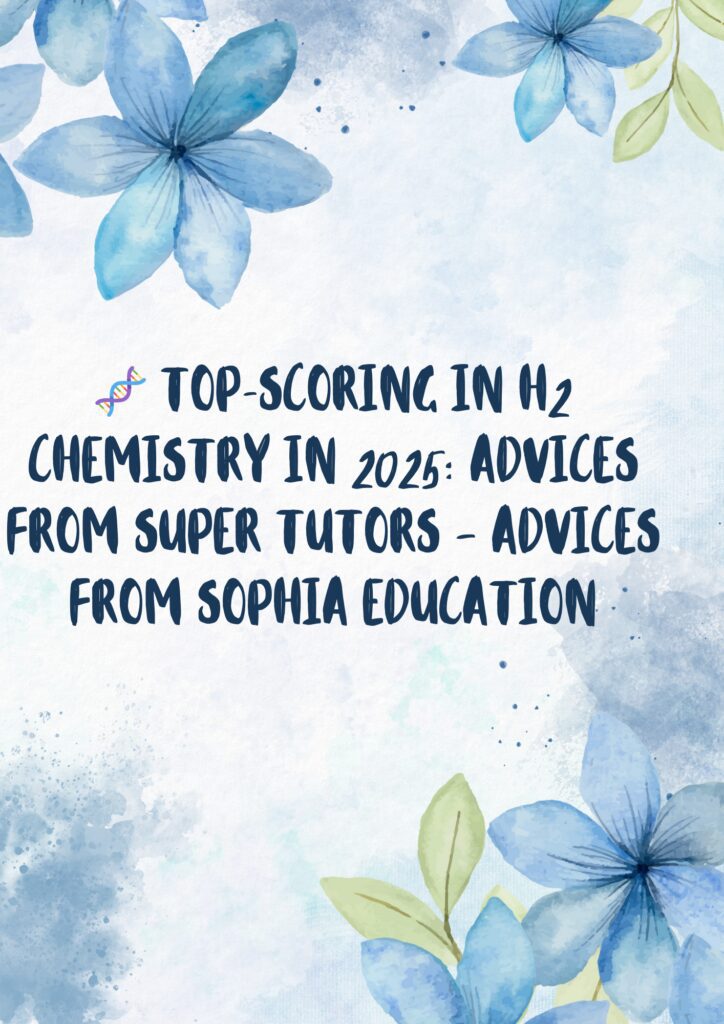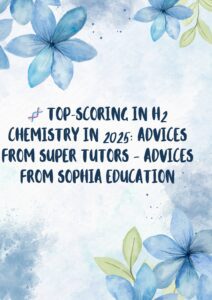🧬 Top-Scoring in H2 Chemistry in 2025: Advice from Super Tutors
Achieving top marks in H2 Chemistry is a formidable goal that requires strategic planning, consistent effort, and effective study techniques. With the 2025 A-Level examinations approaching, it’s crucial to adopt methods that enhance understanding, retention, and application of chemical concepts. Drawing from the expertise of seasoned tutors and educational resources, this comprehensive guide offers actionable advice to help you excel in H2 Chemistry. Let’s embark on this journey to mastery! 🚀
Understanding the H2 Chemistry Syllabus 📚
A solid grasp of the syllabus is the foundation of effective study. The H2 Chemistry syllabus is structured around Core Ideas and Extension Topics, emphasizing both theoretical understanding and practical application.
Core Ideas:
-
Matter: Focuses on atomic structure and the properties of substances.
-
Structure and Properties: Explores chemical bonding, the gaseous state, and the periodic table.
-
Transformation: Covers the mole concept, chemical energetics, reaction kinetics, and chemical equilibria.
Extension Topics:
-
Chemistry of Aqueous Solutions
-
Organic Chemistry
-
Electrochemistry
-
Introduction to the Chemistry of Transition Elements

Familiarizing yourself with these topics will provide a roadmap for your studies and help identify areas requiring deeper focus. For a detailed breakdown, refer to the MOE’s official syllabus document. 📄
Building a Strong Foundation 🏗️
Before delving into complex topics, ensure your foundational knowledge is robust.
Master Basic Concepts
Understanding fundamental principles is crucial. Topics such as atomic structure, chemical bonding, and the mole concept are the building blocks for more advanced material. As highlighted by Twig Learning Center, setting a strong foundation aids in comprehending intricate concepts later on.
Regular Revision
Consistent review of past topics prevents forgetting and reinforces learning. Allocate time each week to revisit previous chapters, ensuring that earlier material remains fresh in your memory. This approach not only aids retention but also helps in connecting concepts across different topics. 🔄
Effective Study Techniques 🎯
Adopting proven study methods can enhance comprehension and retention.
Active Learning
Engage actively with the material by summarizing information in your own words, teaching concepts to peers, or creating mind maps. This deepens understanding and highlights areas that need further clarification.
Practice with Purpose
Regularly attempt practice questions and past examination papers. This not only familiarizes you with the exam format but also helps identify patterns in question types and areas of weakness. As noted by Tutor City, consistent practice is key to mastering application skills.
Utilize Flashcards
For memorizing reactions, definitions, and formulas, flashcards can be highly effective. They promote active recall and spaced repetition, both of which are beneficial for long-term retention. Digital tools like Anki or Quizlet can be useful for this purpose. 🃏
Time Management and Organization ⏳
Balancing multiple subjects and commitments requires effective time management.
Create a Study Schedule
Develop a realistic timetable that allocates specific time slots for each subject, with increased focus on challenging topics. Ensure that your schedule includes breaks to prevent burnout. The Pomodoro Technique—studying for 25 minutes followed by a 5-minute break—can enhance productivity.
Set Achievable Goals
Break down your study sessions into manageable tasks. Instead of aiming to “study organic chemistry,” set a goal to “understand and practice nucleophilic substitution reactions.” This specificity makes tasks less daunting and progress more measurable. 🎯
Seeking External Support 🤝
Sometimes, self-study needs to be supplemented with external resources.
Join Study Groups exchange
Collaborating with peers allows for the exchange of ideas, clarification of doubts, and exposure to different problem-solving approaches. Teaching others is also a powerful method to reinforce your own understanding.
Enroll in Tuition Classes
Professional guidance can provide structured learning and personalized feedback. In Singapore, several reputable tuition centers offer specialized H2 Chemistry classes:
-
The Chemistry Practice: Offers structured programs with experienced tutors. More info
-
Achievers Dream: Focuses on mastering chemistry through tailored lessons. More info
-
Chemistry Guru: Provides both online and on-site classes with comprehensive materials. More info
When selecting a tuition center, consider factors such as class size, tutor qualifications, and teaching methodology. 🏫

Exam Strategies 📝
Approaching the exam with effective strategies can significantly impact performance.
Understand the Exam Format
Familiarize yourself with the structure of the H2 Chemistry exam, including the types of questions and their weightage. This knowledge allows you to allocate time appropriately during the exam. Details can be found on the MOE website.
Practice Under Exam Conditions
Simulate exam conditions by timing yourself while attempting past papers. This practice helps build stamina and improves time management during the actual exam.
Review and Reflect
After completing practice papers, thoroughly review your answers. Understand mistakes and learn the correct approaches. This reflection turns errors into learning opportunities. 🔍
Maintaining Well-being 🌿
Your mental and physical health play a crucial role in academic performance.
Regular Exercise
Incorporate physical activity into your routine to reduce stress and improve concentration. Even short daily workouts can have significant benefits.
Adequate Rest
Ensure you’re getting sufficient sleep, especially as the exam approaches. Sleep is vital for memory consolidation and cognitive function.
Mindfulness and Relaxation
Techniques such as meditation, deep breathing, or yoga can help manage stress and keep you focused. Remember, a calm mind is more receptive to learning. 🧘
Leveraging Technology and Resources 💻
In the digital age, numerous resources are available to aid your studies.
Online Platforms
Websites like Khan Academy offer free tutorials on various chemistry topics. These can supplement your learning and provide alternative explanations.
Mobile Apps
Apps like Chemistry By Design offer interactive ways to learn reaction mechanisms and pathways, making complex topics more accessible.
Video Lectures
Platforms like YouTube host channels dedicated to chemistry education, providing visual and auditory learning experiences that can enhance understanding. 🎥
Conclusion 🎓
Excelling in H2 Chemistry requires a multifaceted approach that combines understanding the syllabus, employing effective study techniques, managing time wisely, seeking support when needed, and maintaining overall well-being. By implementing the strategies outlined in this guide, you’re well on your way to achieving top scores in the 2025 A-Level examinations.





